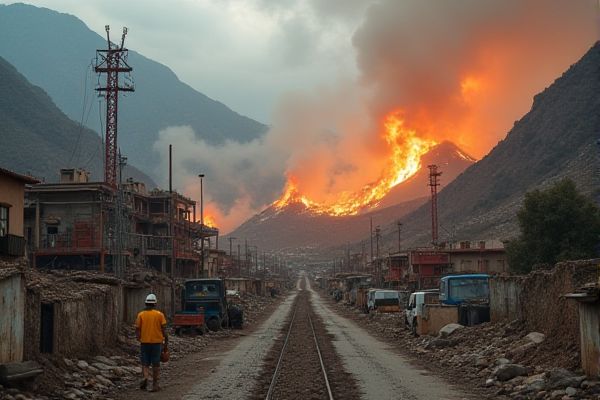
Ethiopia offers a variety of disaster risk management job opportunities, particularly within governmental and non-governmental organizations focused on reducing vulnerability to natural disasters. Positions range from researchers and analysts who assess risks to field coordinators implementing community-based disaster response initiatives. Educational qualifications often include degrees in environmental science, public health, or disaster management, along with relevant experience in emergency situations. Engaging with local communities and understanding cultural contexts is crucial for professionals aiming to create effective disaster management strategies.
Job Description
Disaster risk management jobs in Ethiopia involve critical roles focused on reducing vulnerability to natural disasters and enhancing community resilience. Positions typically require expertise in disaster assessment, emergency response coordination, and the implementation of risk reduction strategies tailored to local contexts. These roles often entail collaboration with government agencies, NGOs, and international organizations to facilitate effective disaster preparedness programs. Strong communication, analytical skills, and a deep understanding of Ethiopia's socio-economic landscape are essential for success in this field.
Requirement
Disaster risk management jobs in Ethiopia typically require a relevant degree in fields such as environmental science, public health, or disaster management. Candidates should possess strong analytical skills to assess risks and develop effective mitigation strategies while demonstrating familiarity with local and international disaster response frameworks. Experience working with communities or non-governmental organizations in Ethiopia is highly valued, along with the ability to communicate effectively in both Amharic and English. Understanding the socio-economic landscape of Ethiopia will enhance your qualifications and capability to implement successful disaster management initiatives.
Salary and Perks Expected
Disaster risk management jobs in Ethiopia offer competitive salaries that vary based on experience, education level, and the specific organization. Entry-level positions may start around $400 to $600 per month, while more experienced professionals can earn upwards of $1,000 or more monthly. Benefits often include health insurance, allowances for travel and housing, and opportunities for professional development through training programs. Engaging in this field not only provides a rewarding career but also contributes significantly to national resilience and community safety in Ethiopia.
Similar Job Names
- Disaster Risk Management Coordinator
- Emergency Response Manager
- Risk Assessment Specialist
- Disaster Recovery Officer
- Resilience Building Officer
- Community Engagement Officer
- Climate Change Adaptation Specialist
- Programme Officer for Disaster Preparedness
- Disaster Risk Reduction Consultant
- Humanitarian Response Analyst
- Policy Advocacy Officer
- Training and Capacity Building Officer
- Field Coordinator for Disaster Response
- Environmental Risk Analyst
- Health Emergency Coordinator
- Logistics Officer for Disaster Relief
- Disaster Information Management Officer
- Social Protection Officer
- Urban Disaster Risk Management Specialist
- Monitoring and Evaluation Specialist
Job Expectation Concept
Disaster risk management jobs in Ethiopia require professionals to develop and implement strategies aimed at minimizing the impact of natural disasters on communities. With a focus on vulnerability assessments, disaster preparedness, and response planning, these roles emphasize collaboration with local governments and NGOs. Your ability to analyze data related to climate change, population displacement, and resource allocation will be crucial in formulating effective interventions. Continuous education and awareness initiatives are essential for fostering resilience among communities in the face of increasing environmental challenges.
Career Advantage and Weakness
Disaster risk management jobs in Ethiopia present significant career advantages, including the opportunity to contribute meaningfully to community resilience and sustainability. The growing emphasis on climate adaptation and disaster preparedness in the country creates a demand for skilled professionals in this field. However, challenges such as limited resources and the need for advanced training can be obstacles to success. Fostering partnerships with governmental and non-governmental organizations can enhance your prospects and effectiveness in this vital sector.
Important Thing Must Know
Disaster risk management jobs in Ethiopia are critical due to the country's vulnerability to natural hazards such as droughts, floods, and landslides. Various organizations, including government agencies, NGOs, and international bodies, actively seek professionals to develop and implement effective risk reduction strategies. Skills in planning, assessment, and community engagement are essential for success in this field. Opportunities often exist in project management, research, and policy development, making it a versatile career path. Your role can significantly contribute to improving resilience in communities affected by disasters.
Alternative Career Options
Ethiopia offers various alternative career options in disaster risk management, including roles in non-governmental organizations (NGOs), governmental agencies, and international bodies. Positions may involve developing community resilience programs, conducting risk assessments, and implementing emergency preparedness plans. Opportunities also exist in research and academia, focusing on climate change adaptation and environmental sustainability strategies. Engaging in these fields allows you to contribute to enhancing national capabilities in addressing disasters and improving the lives of vulnerable communities.
Companies List
- Global Green Growth Institute (GGGI)
- Ethiopian Red Cross Society
- United Nations Development Programme (UNDP)
- International Organization for Migration (IOM)
- World Food Programme (WFP)
- Action Against Hunger
- Ethiopian Disaster Risk Management Commission
- Oxfam International
- Save the Children
- Mercy Corps
List of Ideal City
Addis Ababa, the capital city, serves as the primary hub for disaster risk management initiatives in Ethiopia, hosting numerous governmental and non-governmental organizations. Bahir Dar, known for its strategic location near Lake Tana, also offers opportunities in disaster response and natural resource management. Dire Dawa, with its growing urban infrastructure, is increasingly focused on improving resilience against environmental hazards. Mekelle, the capital of the Tigray region, has seen investments in training and systems aimed at mitigating disaster impacts, making it a promising location for career prospects in this field.
 jobs-ethiopia.com
jobs-ethiopia.com